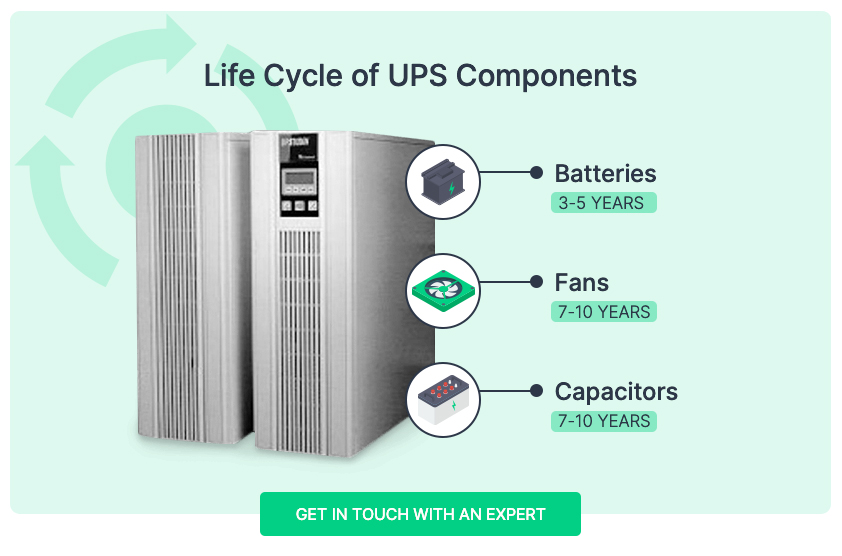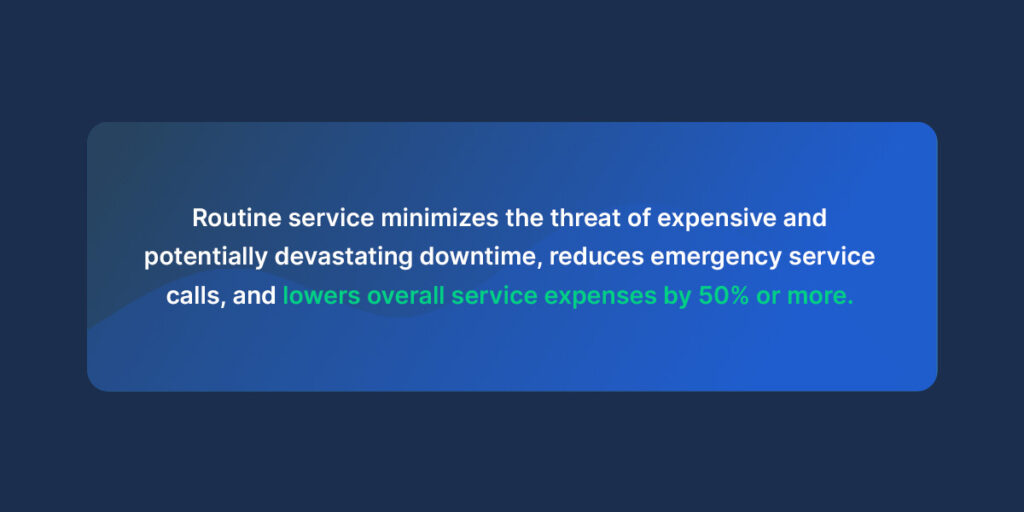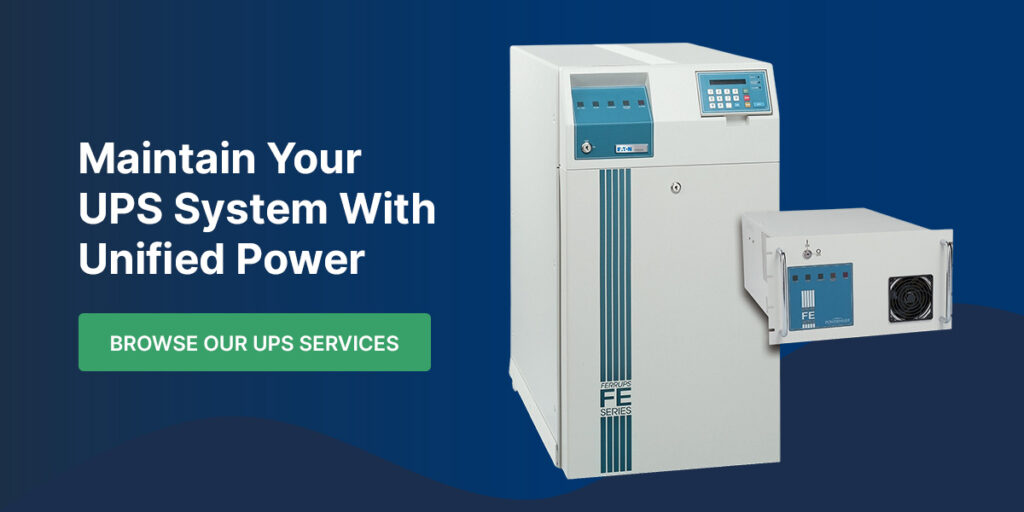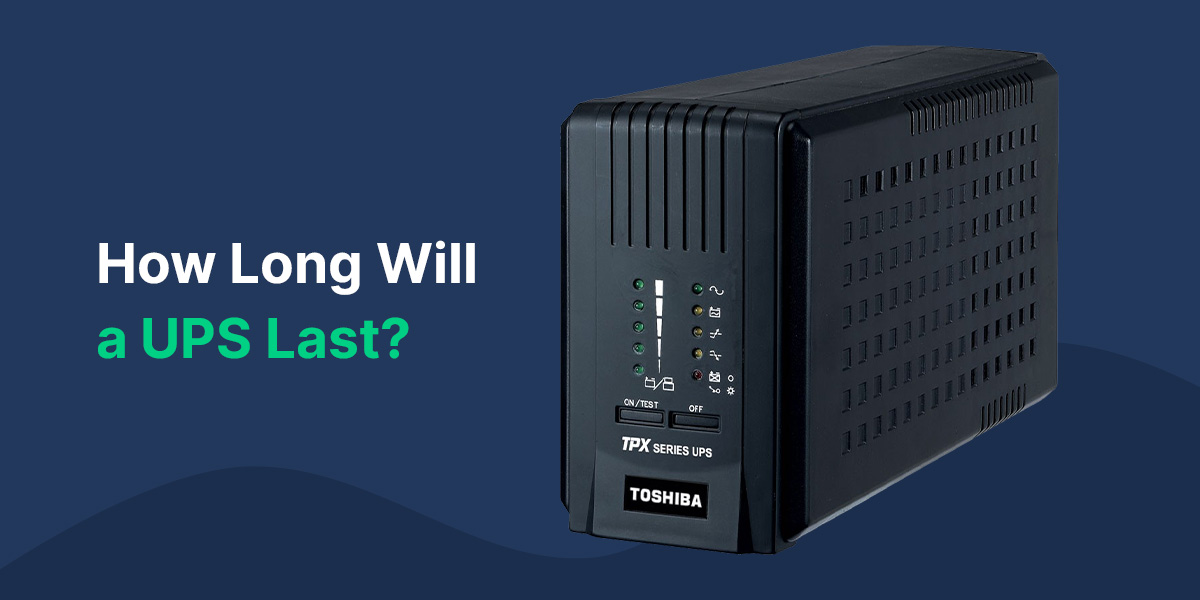Because an uninterruptible power supply (UPS) can represent a significant capital investment, it is Because an uninterruptible power supply (UPS) can represent a significant capital investment, it is important to have a general idea of how many years that investment will last. Determining longevity in power solutions lies in understanding the life cycle of a UPS’s key components, including batteries, fans, and capacitors.
Key Components of a UPS and How Long One Lasts
Understanding a UPS system’s critical components lets you better assess how long your system will operate and recognize critical service parameters, including preventive maintenance requirements, the optimal time for battery replacement and knowing when a unit is most at risk for a UPS unit failure.
1. Batteries
Batteries are electrochemical energy storage devices that convert chemical energy into electrical energy the UPS relies on to operate during a power loss. Even those that are cared for and maintained typically require replacement every three to five years because their chemicals naturally deplete over time.
UPS Battery Function
While the main function of a UPS battery is to take over the connected load if the power goes out, batteries also enhance system reliability during normal operations. With the ability to recognize even minor fluctuations in the incoming power supply, the UPS switches to direct current power and converts it to alternating current power when incoming utility power drops below or surges above safe voltage levels.
In this way, the UPS batteries prevent dirty power from reaching sensitive electronic equipment — which is especially important in rural areas and other environments where the power supply is often unstable.
Factors Affecting Battery Longevity
Most UPS batteries have a life expectancy of three to five years when operating under ambient conditions — 68 to 77 degrees Fahrenheit. Batteries that operate in conditions outside the recommended parameters can fail much faster. Additionally, operating in an environment with poor-quality utility power can reduce lifespan, as this can cause batteries to cycle frequently. Organizations that do not engage in regular service and preventive maintenance may also notice reduced battery life.
Signs of Battery Failure
While UPS batteries can last up to five years, unfortunately, they can fail without warning — which can be devastating if a power outage occurs and takes down the critical load at the same time. Batteries that are approaching the end of their useful life may display the following warning signs:
- Repeating alarms
- Flashing panel lights
- Abnormal terminal displays
To ensure ongoing reliability and uptime, the optimal approach is to engage in regular battery service and replacement.
2. Fans
Fans are located throughout UPS systems to cool critical components like the inverter and rectifier. In general, the larger the UPS, the more fans it will have. Like other components, the lifespan of a UPS fan varies based on factors such as temperature, humidity, particulates, clogged air filters, and the power capacity the UPS is operating under. Inefficient fans can cause the components to run hotter and consequently deteriorate much faster. One of the few UPS components that is mechanical in nature, a fan will wear out over time and need to be replaced.
Factors that affect a fan’s lifespan include:
- Grease in the sealed bearings: The sealed bearings within fans contain grease that dissipates over time and slows fan speed, creating heat and noise.
- Atmospheric dust: Dust forces fans to work harder to keep air flowing.
- Component switching: Component switching inside of a UPS generates significant heat, which can further impact fans.
When operating in optimal environmental conditions, a UPS fan has a typical service life of five to seven years. Proactively replacing fans helps to minimize the risk of serious failure.
3. Capacitors
A UPS is comprised of dozens of capacitors in various sizes. Responsible for smoothing and filtering voltage fluctuations, UPS capacitors contain a pair of conducting surfaces, usually electrodes or metallic plates, which are enclosed in chromium-plated or aluminum cylinders. Capacitors typically require replacement every five to eight years. However, some can last up to a decade, while those operating under unfavorable circumstances can fail faster.
Rather than waiting until UPS capacitors reach the end of their rated service life, it is important to request replacement quotes when capacitors approach five years. Also be sure to devote time to reading service reports closely. If you notice impending signs of failure, you can replace the capacitors immediately.

How to Extend Your UPS System’s Lifespan
You can lengthen the life expectancy of your UPS system by taking specific steps:
- Maintain batteries in a favorable environment: Cool, dry environments are ideal. Hot and humid environments can damage batteries.
- Test batteries: Impedance testing, electrochemical testing, load bank testing, and partial discharge testing can determine a battery’s health and functionality.
- Replace batteries: Semiannual battery checkups, regardless of their age, can help you evaluate weaknesses.
- Avoid system overload: Only use your UPS system to power devices at the capacity it was designed to support. Otherwise, your battery may drain quickly.
- Check and replace filters: Dust and debris can block filters and cause the UPS to overheat. Conduct monthly inspections to avoid this issue.
- Inspect capacitors annually: While capacitors typically last at least five years, annual inspections can help you catch issues and prolong your system’s lifespan.
- Find faulty connections: Annual inspections help identify loose connections that may lead to UPS failure.
- Clean contactors: Dust can also accumulate in UPS contactors and lead to costly downtime.
Rather than take on preventive maintenance yourself, it is wise to rely on a trusted technician. Prevention pays off — the mean time between failures is more than 20 times better for systems that receive semiannual routine maintenance over those that do not.
The Importance of Routine Maintenance

Routine maintenance is the best way to extend your system’s lifespan. With proper servicing, a UPS can last for more than a decade. Routine preventive maintenance contributes to a UPS system’s reliability, enabling technicians to detect potential points of failure before they become expensive problems. Engaging in routine service minimizes the threat of expensive and potentially devastating downtime, reduces emergency service calls and lowers overall service expenses by 50% or more.
During a preventive maintenance service call, the field engineer will complete a number of vital assessments, including:
- Measuring cell voltage levels
- Checking batteries for loose connections
- Visually inspecting for battery leakage, swelling and corrosion
Routine service helps ensure batteries operate at 100% capacity and reduces the rate and frequency of battery replacement.
When to Replace Your UPS System
Even UPS systems that have been impeccably maintained and serviced will eventually reach the end of their useful life. Because the decision to replace a UPS can be complicated — and expensive — it is important to consider numerous factors, including the return on investment, desired technology and future load requirements.
Calculating a UPS’s precise return can be difficult because it is tough to put a price tag on reliability. When considering replacement, factors to consider include:
- Efficiency: A power solution operating at less than 50% load is generally a good candidate for replacement. Doing so will likely lower both CapEx and OpEx while also increasing power usage effectiveness, all of which contribute to lower total cost of ownership.
- Battery replacement requirements: Another consideration is whether it’s time to replace the batteries, as the cost of a battery replacement service can be applied toward a new UPS.
- Age of existing system: The age of the existing UPS can significantly impact ongoing service costs, as replacement parts are more difficult to find and typically higher once end-of-life occurs. For customers without a service contract, the risk of time and material charges will also likely increase proportionally with the age of the UPS.
- Organizational expansion: If your organization is operating its existing UPS at capacity or has plans to expand, a new UPS may be in order.
Advances in technology have also created power systems with a slew of attractive new features, including:
- Power factor-corrected rectifiers that yield reduced demand charges
- Decentralized static-bypass switches and controls that eliminate the single points-of-failure that can stop the entire power supply
- Remote monitoring capabilities that allow the system to pass on information to a monitoring center
- Internet of Things integration that allows the system to communicate battery life and load level information
- The integration of lithium-ion batteries, which offer longer lifespans and faster recharge times
- Compact models with reduced footprint for space savings
Organizations operating older UPS equipment may find these upgrades appealing.
3 Common Myths About UPS System Maintenance and Life Expectancy
As you consider UPS system maintenance, repairs and replacement, keep these three myths in mind:
- UPS systems do not require maintenance: Your UPS does require regular maintenance to function optimally.
- UPS batteries never need to be replaced: Like other types of batteries, UPS batteries degrade over time and require replacement.
- It’s better to wait for the system to fail to replace it: Proactive maintenance can help you avoid the costs associated with unexpected downtime and emergency repairs, which can make it a much more cost-effective option.
Maintain Your UPS System With Unified Power
For more than two decades, Unified Power has been a trusted provider of world-class UPS services that optimize the reliability and performance of critical power equipment. Regardless of the age of your UPS, Unified Power’s experienced, knowledgeable technicians are dedicated to helping extend the life of your power systems, providing unparalleled quality and an affordable service alternative to OEMs.
Our comprehensive services include:
- UPS preventive maintenance plans
- Generator maintenance
- Emergency service
- Battery preventive maintenance
- Battery capacity testing and recycling
- UPS capacitor service
- UPS rentals
Professionally trained on all major manufacturers’ equipment, our field engineers are located across the nation and are ready to perform the services you need at your convenience — whether it’s the middle of the night or during regular business hours. Request a quote or service from Unified Power today!


